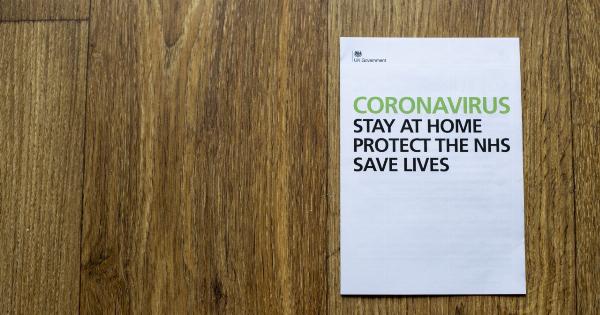As responsible pet owners, it is important for us to create a safe environment for our furry friends. While we may think that our homes are free from danger, there are several common household toxins that can pose a serious threat to our dogs.
From certain foods to cleaning products, it is crucial to be aware of these potential hazards and take proactive measures to protect our beloved pets. In this article, we will discuss ten common household toxins that can harm your dog and provide tips on how to keep them safe.
1. Chocolate
We all know that chocolate is a delicious treat for humans, but it can be extremely harmful to our canine companions. Chocolate contains theobromine, a compound that dogs cannot metabolize efficiently.
Ingesting chocolate can cause symptoms such as vomiting, diarrhea, rapid breathing, abnormal heart rhythm, seizures, and even death. It is important to keep all chocolate products, including baking chocolate, cocoa powder, and chocolate-flavored treats, out of your dog’s reach.
2. Grapes and Raisins
While grapes and raisins may seem like harmless snacks, they can cause kidney failure in dogs. Even a small amount can be toxic and lead to symptoms such as vomiting, diarrhea, decreased appetite, weakness, and increased thirst.
It is best to avoid feeding your dog any grapes or raisins, and make sure they are kept securely stored away.
3. Medications
Human medications, including over-the-counter drugs and prescription medications, can be extremely dangerous to dogs. Painkillers, antidepressants, cold medicines, and even vitamins can cause serious harm if ingested by your pet.
Always keep medications securely stored in cabinets or drawers that your dog cannot access, and be cautious when taking them around your pet.
4. Cleaning Products
Many common household cleaning products contain chemicals that are toxic to dogs.
Bleach, toilet bowl cleaners, floor cleaners, and even laundry detergents can cause gastrointestinal upset, chemical burns, and respiratory issues if your dog comes into contact with them. Store these products in a locked cabinet or high shelf to prevent accidental ingestion or exposure.
5. Xylitol
Xylitol is a sugar substitute commonly found in sugar-free gums, candies, and baked goods. While harmless to humans, xylitol is extremely toxic to dogs.
It can cause a sudden release of insulin, resulting in low blood sugar levels, seizures, and liver failure. Even small amounts of xylitol can be life-threatening for your furry friend, so make sure to read ingredient labels carefully and keep all xylitol-containing products out of reach.
6. Onions and Garlic
Onions and garlic, whether raw, cooked, or in powdered form, can be toxic to dogs. They contain compounds that can damage their red blood cells, leading to anemia. Symptoms may include weakness, lethargy, pale gums, vomiting, and increased heart rate.
It’s important to avoid feeding your dog any food that contains onions or garlic, and ensure that they are not accessible to your pet.
7. Antifreeze
Antifreeze is highly toxic to dogs and can be fatal if ingested. It has a sweet taste that can attract dogs, but even a small amount can cause kidney failure and other severe health issues.
Unfortunately, dogs are often exposed to antifreeze when it leaks from car radiators or spills during maintenance. Keep your dog away from areas where antifreeze is being used or stored, and promptly clean up any spills.
8. Rodenticides and Insecticides
Many common pest control products, such as rodenticides and insecticides, contain toxic chemicals that can harm dogs. These products are often made to attract pests, making them appealing to curious dogs.
Ingesting or coming into contact with these chemicals can cause symptoms ranging from gastrointestinal upset to seizures and even death. Always follow instructions carefully when using these products and keep them well out of your dog’s reach.
9. Plants
While plants can add beauty to our homes, several common indoor and outdoor plants can be toxic to dogs. Examples include lilies, azaleas, tulips, daffodils, and sago palm, among others.
Ingesting these plants can cause symptoms such as vomiting, diarrhea, drooling, abdominal pain, and in severe cases, organ failure. It is important to keep these plants inaccessible to your dog or opt for pet-safe alternatives.
10. Tobacco and E-cigarettes
Tobacco products, including cigarettes, cigars, and chewing tobacco, contain nicotine, which can be toxic to dogs.
Ingesting even a small amount of nicotine can cause symptoms such as vomiting, diarrhea, elevated heart rate, tremors, seizures, and respiratory distress. E-cigarettes and vaping liquids can also pose a significant risk due to their nicotine content. Keep all tobacco products and e-cigarettes out of your dog’s reach.
Conclusion
Being aware of the potential hazards posed by common household toxins is vital for ensuring the safety and well-being of our dogs.
By taking precautions such as keeping harmful substances securely stored out of their reach, we can prevent accidental ingestion and minimize the risk of harmful effects. However, it’s important to remember that prevention is key, and immediate veterinary care should be sought if your dog accidentally ingests any toxic substances.
By staying informed and vigilant, we can create a safe and toxic-free environment for our furry friends to thrive in.





























